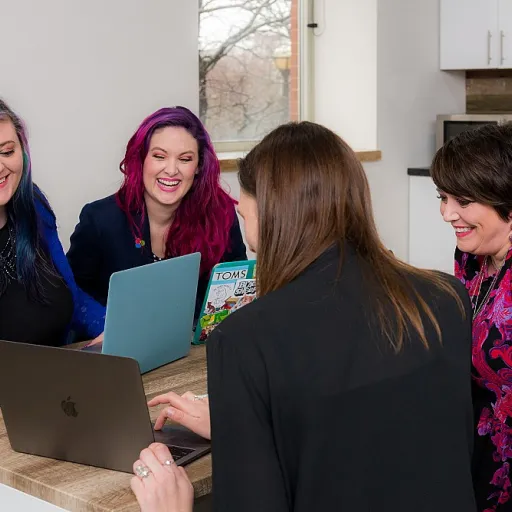
Understanding word finding challenges in mentoring
Recognizing the Importance of Word Retrieval in Mentoring
In professional mentoring, clear communication is essential for building trust and facilitating growth. Yet, even experienced mentors and mentees can face word finding challenges during conversations. These moments, when the right word seems just out of reach, can disrupt the flow of speech and impact the effectiveness of guidance. Word retrieval issues are not limited to children or those with speech language disorders; they can affect anyone, especially in high-pressure or unfamiliar situations.
Word finding difficulties may appear as pauses, hesitations, or the use of vague language. While these issues are often associated with children therapy, speech therapy, or cognitive behavioral interventions, adults in professional settings can also benefit from understanding and addressing them. Recognizing these challenges is the first step toward fostering open communication and supporting ongoing development of vocabulary and communication skills.
- Speech and language processing: Sometimes, the brain needs extra time to process and retrieve the right word, especially when discussing complex topics or new concepts.
- Behavioral and sensory factors: Stress, anxiety, or sensory processing issues can make it harder to find the right words, even for skilled communicators.
- Impact on mentoring relationships: Struggling with word retrieval can lead to frustration, misunderstandings, or reduced confidence for both mentors and mentees.
Understanding these challenges sets the stage for exploring practical strategies and interventions. Whether you are seeking to help a child with speech disorders or looking to enhance your own communication skills in a professional context, recognizing the behavioral and cognitive aspects of word finding is crucial. For a deeper dive into the nuances of effective communication in mentoring, you may find this guide on crafting the art of mentoring prose helpful.
Common causes of word finding difficulties
Why Word Retrieval Can Be Challenging in Mentoring
Word finding difficulties are not just a concern for children or those in speech therapy. In professional mentoring, these challenges can impact communication, confidence, and the overall effectiveness of the mentoring relationship. Understanding the underlying causes is a key step in developing strategies that help both mentors and mentees improve their communication skills.
- Cognitive Processing: Sometimes, the brain needs extra time to retrieve the right word. This can be due to stress, multitasking, or simply the complexity of the topic. Cognitive behavioral factors, such as anxiety or pressure to perform, may also slow down word retrieval.
- Vocabulary Gaps: Even experienced professionals may encounter moments when the specific vocabulary escapes them. This is common when discussing new concepts or working in a field with specialized language.
- Sensory Processing: Sensory overload or distractions in the environment can disrupt the mental process of finding the right word. This is similar to what is observed in children therapy or sensory processing disorders, where external stimuli impact speech and language skills.
- Speech and Communication Disorders: Some individuals may have underlying speech disorders or communication disorders that make word retrieval more difficult. While these are often addressed in speech therapy or naming therapy for kids, adults can also benefit from intervention-based speech strategies.
- Behavioral and Emotional Impact: Frustration from word finding issues can lead to avoidance behaviors, reduced participation, or even withdrawal from mentoring sessions. Behavioral therapy or cognitive behavioral therapy (CBT) techniques can help address these emotional responses.
It’s important to recognize that word finding issues are not a sign of incompetence. They are a natural part of communication, especially in high-pressure or unfamiliar situations. By understanding the causes, mentors can better support mentees and create a more inclusive environment. For a deeper dive into how these challenges appear in educational settings, you might find this guide on effective mentor texts for persuasive essays insightful, as it explores strategies that can also be adapted for professional mentoring contexts.
Practical strategies for improving word retrieval
Step-by-step guide to strengthening word retrieval
Professionals in mentoring roles often encounter word finding challenges, which can impact effective communication. Addressing these issues requires practical strategies that support both mentors and mentees, especially when working with individuals who may have speech or language processing difficulties. Here is a step-by-step guide to help improve word retrieval skills during mentoring sessions:
- Pause and allow processing time: Give your mentee a moment to find the right word. This simple step can reduce pressure and support natural speech flow, especially for those with communication disorders or sensory processing issues.
- Use semantic cues: Offer hints related to the meaning or category of the word. For example, if a mentee struggles to recall "vocabulary," you might prompt with "It’s a group of words we use in language." This technique is often used in speech therapy and naming therapy.
- Phonemic cues: Provide the first sound or syllable of the word. This can trigger retrieval and is a common strategy in both child and adult speech therapy interventions.
- Encourage self-cueing: Guide mentees to develop their own prompts, such as describing the word, using gestures, or drawing. These behavioral strategies help build independence and confidence in communication skills.
- Repetition and rehearsal: Practice key vocabulary and concepts regularly. Repetition supports memory and retrieval, which is especially helpful for kids and adults with speech disorders.
- Incorporate multi-sensory activities: Use visual, auditory, and tactile cues to reinforce learning. Sensory-based speech interventions can be particularly effective for children therapy and those with sensory processing needs.
- Model effective strategies: Demonstrate how to handle word finding issues by thinking aloud or using alternative words. This approach helps mentees see that occasional word retrieval difficulties are normal and manageable.
These strategies are grounded in evidence-based speech language and cognitive behavioral therapy practices. They can be adapted for both children and adults, and are especially useful for mentors working with individuals experiencing communication or speech language disorders. For a deeper dive into setting measurable communication goals, consider this guide to crafting effective goals for performance reviews.
By integrating these practical steps, mentors can help children and adults alike develop stronger word retrieval skills, leading to more effective and confident communication in professional settings.
Using visual aids and prompts in mentoring sessions
Visual Tools to Support Word Retrieval
Visual aids can play a significant role in helping both mentors and mentees overcome word finding challenges during professional mentoring sessions. These tools are not just for children or those in therapy speech settings; they are equally effective for adults navigating complex vocabulary or communication disorders.- Mind maps and diagrams: Creating visual representations of concepts helps organize thoughts and makes word retrieval easier. This strategy is often used in speech therapy and naming therapy to support skills children and adults alike need for effective communication.
- Keyword cards: Having a set of cards with key terms or phrases relevant to the discussion can prompt memory and guide the conversation. This is especially useful for those experiencing speech language or cognitive behavioral issues that impact word finding.
- Visual schedules or step guides: Outlining the flow of a mentoring session with visuals can reduce anxiety and provide cues for what vocabulary or topics might come next. This approach is grounded in behavioral therapy and sensory processing interventions.
Prompting Techniques for Effective Communication
Prompts are another practical strategy to help with word retrieval and speech production. These can be adapted from therapy cbt and ccc slp practices, but are highly relevant in professional mentoring:- Phonemic cues: Offering the first sound or syllable of a word can help trigger recall, a technique commonly used in speech disorders intervention.
- Semantic prompts: Asking guiding questions about the meaning or context of a word can help mentees find the right term. This is a step often used in both child and adult therapy to build vocabulary and communication skills.
- Behavioral reinforcement: Positive feedback and encouragement when a mentee successfully retrieves a word can boost confidence and reduce anxiety around speech issues.
Integrating Visuals and Prompts in Practice
For mentors, integrating these strategies into sessions does not require specialized training in children therapy or intervention speech. It is about being mindful of the impact that visual and prompt-based supports can have on processing and retrieval. Whether working with kids, adults, or teams, these approaches help create a more inclusive environment for those with communication disorders or word finding difficulties. Over time, these strategies can become a natural part of your mentoring toolkit, supporting ongoing development of communication skills for all participants.Building a supportive environment for open communication
Fostering Trust and Openness in Mentoring Relationships
Creating a supportive environment is a crucial step for mentors aiming to help mentees overcome word finding challenges. Open communication does not happen by accident—it requires intentional strategies and a commitment to understanding the unique needs of each individual, whether working with adults or children facing speech and language issues. A safe, encouraging space allows mentees to express themselves without fear of judgment. This is especially important for those dealing with communication disorders or word retrieval difficulties, as anxiety can further impact their ability to find the right word or express their thoughts clearly.- Normalize word finding difficulties: Remind mentees that everyone experiences moments of hesitation or word loss, and these issues are common in both children and adults. This helps reduce stigma and builds confidence.
- Encourage patience and active listening: Give mentees time to process and retrieve words. Avoid interrupting or finishing sentences for them, as this can increase pressure and hinder progress.
- Use positive reinforcement: Celebrate small successes in vocabulary retrieval or speech improvement. Acknowledging progress, even in minor steps, motivates ongoing effort and engagement.
- Model effective communication strategies: Demonstrate techniques such as pausing, rephrasing, or using visual aids. These strategies can help mentees develop their own toolkit for overcoming word finding issues.
- Address sensory and behavioral factors: Recognize that sensory processing or behavioral therapy needs may impact communication. Collaborate with professionals in speech therapy, cognitive behavioral therapy (CBT), or children therapy to provide a holistic approach.
Encouraging ongoing development of communication skills
Fostering Lifelong Communication Growth
Supporting ongoing development of communication skills is essential in professional mentoring. Word finding and retrieval issues can affect anyone, not just children or those in therapy. By encouraging continuous improvement, mentors help mentees build confidence and resilience in their speech and language abilities. A proactive approach involves integrating regular feedback and reflection into sessions. This helps identify persistent word finding challenges and allows for timely intervention. For example, after practicing naming therapy or vocabulary exercises, mentors can discuss what strategies worked best and which areas need more attention.- Encourage mentees to keep a personal log of challenging words or phrases. This step guide helps track progress and highlights patterns in word retrieval issues.
- Recommend resources such as speech therapy or cognitive behavioral therapy (CBT) techniques when appropriate, especially for those with communication disorders or sensory processing difficulties.
- Promote peer support and group discussions. Sharing experiences can normalize word finding struggles and introduce new strategies for improvement.
- Integrate behavioral therapy principles to address anxiety or frustration related to speech difficulties. This can reduce the impact of negative emotions on communication skills.













